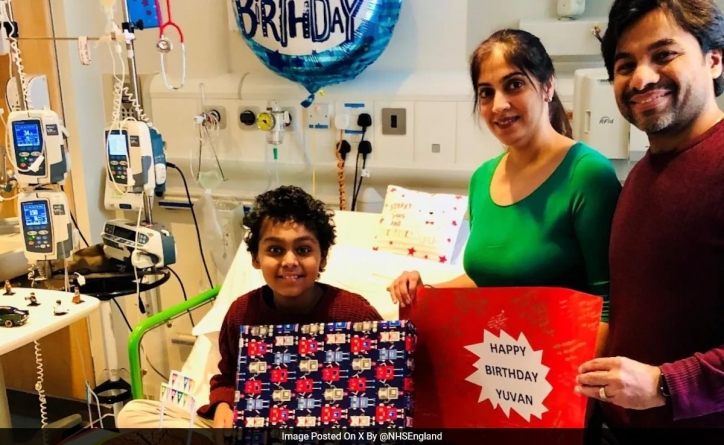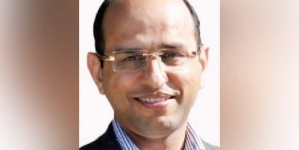-
IRELAND: “From 800 to 7,000”: Ireland’s Education Appeal Soars Among Indian Students - 10 hours ago
-
TORONTO: Canada Sets Weekly Work Hour Limit For Indian Students At 24 - 1 day ago
-
TORONTO: India strongly protests ‘Khalistan’ slogans at a public event attended by Canadian leaders - May 2, 2024
-
TOKYO: Japan Offers Scholarships To Indian Students Pursuing Research - May 1, 2024
-
ZAGREB: India-Croatia Foreign Office Consultations (FOC) - May 1, 2024
-
BUCHAREST: Government Of Romania To Offer Scholarships To Indian Students - April 30, 2024
-
WASHINGTON: India Now Second-Largest Source Country For New Citizens In US- Report - April 30, 2024
-
LONDON: Run For Modi” Event In London To Drum Up Support For PM Modi - April 29, 2024
-
LONDON: Indian-Origin Candidate On How He Plans To Win London Mayoral Polls - April 28, 2024
-
HARVARD: No Country Is Perfect”: Physics Wallah Urges Indian Students At Harvard, Stanford To Return - April 27, 2024
LONDON: Indian-Origin Teen In UK Gets “Life-Changing” Cancer Treatment
LONDON: Yuvan Thakkar, an Indian-origin teenager diagnosed with cancer, says he is now able to enjoy the things he loves after life-changing treatment thanks to a fund set up by the UK’s state-funded National Health Service to make innovative therapies accessible to thousands of patients.
According to NHS England, 16-year-old Mr Thakkar from Watford near London was the first child in the UK to benefit from a pioneering CAR T therapy called tisagenlecleucel (Kymriah) thanks to its Cancer Drugs Fund (CDF).
It comes as the National Health Service (NHS) marks a milestone this weekend of 100,000 patients benefitting from early access to the latest and most innovative treatments with the help of CDF. The undisclosed cost of such treatments is covered by the fund.
“My life has changed so much since I received the CAR T therapy,” said Mr Thakkar, who thanked Great Ormond Street Hospital (GOSH) in London for the “incredible” care he received.
“I remember I had to take so many trips to hospital and had long periods out of school… They have helped me recover to a state where I am able to enjoy so many things I love doing, such as playing snooker or pool, meeting friends and family, and going on wonderful holidays. It’s hard to imagine how things would have been if the treatment wasn’t available,” he said.
Mr Thakkar, diagnosed with a form of leukaemia aged six, received a treatment which modifies a person’s immune cells to recognise and attack cancer cells.
His treatment began in 2019, when he was 11 years old after he relapsed following other treatments such as chemotherapy and a bone marrow transplant. His mother Sapna said the family had received a “second chance” at life since the success of the treatment. Without the fast-track access available through the CDF, the 45-year-old said there may have been no other way for her son to receive the life-saving treatment.
“It felt like our prayers were finally answered. We still feel so grateful for this chance that’s been given to us and not a single day passes by when we haven’t felt thankful for all the doctors and nurses that have helped us through this long and difficult journey,” said Sapna Thakkar.
The CDF, which opened in its current form in July 2016, is used by NHS England to provide fast-tracked access for patients to all new cancer treatments approved by the National Institute for Health and Care Excellence (NICE), in addition to gathering further evidence of long-term effectiveness for promising drugs. It allows faster access to more than 100 drugs to help improve, extend or – in some cases – save their lives.
“Treating 100,000 cancer patients in England with innovative treatments through the Cancer Drugs Fund is a fantastic milestone for the health service to reach, and testament to the hard work of oncologists and their teams across the country,” said Professor Sir Stephen Powis, NHS national medical director.
“This vital fund is helping ensure patients get access to the most promising drugs far quicker than would otherwise be the case, helping people with cancer like Yuvan receive a life-changing intervention that sets a path for a longer, healthier life spent with family and friends,” he said.
The fund benefits people with common cancers, such as breast, lung, colorectal and prostate, as well as those with less common cancers, such as ovarian, cervical, kidney, skin, myeloma, lymphoma and leukaemia, and rare cancers, including thyroid and biliary tract.
The current CDF budget of GBP 340 million is 70 per cent more than the previous CDF and is used alongside NHS England’s Innovative Medicines Fund of GBP 340 million, which the health service said means a total of GBP 680 million is ringfenced for fast-tracking new medicines.
























